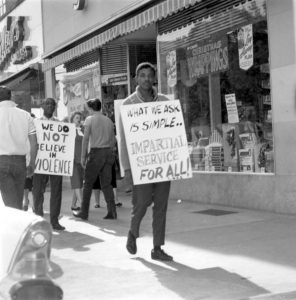The Tampa Woolworth Project seeks to ensure the world remembers.

(State Archives of Florida) Boycotts and picketing were conducted here in Tallahassee and across the country to integrate lunch counters at Neisner’s McCrory’s, F.W. Woolworth’s, Walgreen’s and Sear’s stores. December 6-7, 1960.
Tampa, Florida – On Martin Luther King, Jr.’s holiday, there’s talk in the Tampa Bay area about how to keep his legacy alive by creating historical markers, or even a museum display, that recognizes the countless number of people from all races, religions and backgrounds that pushed for equality in Tampa. Jim Davis’ grandfather, Cody Fowler, was a prominent attorney who played a big role in the civil rights movement in Tampa. Davis says, “When a lot of strife broke out as the south started integrating, my grandfather stood up and said the right thing to do was to recognize we are all God’s children – black and white.”Davis was just a young child at that time but many years later he discovered the extent of his grandfather’s contributions. He adds, “He started Progress Village. He was very proud of his role with Governor Leroy Collins in helping usher in a relatively peaceful transition to racial integration here in our community and here in the state.”No one remembers that time better than Clarence Fort, who at the age of 21 organized the lunch counter sit-ins in Downtown Tampa, which started on February 29, 1960 at the F.W. Woolworth store. Fort says, “You could spend a thousand dollars in the store but you could not go over and get a hamburger or a coke or a hot dog. If you did, you had to get it to go or stand up at the end of the counter.”
Tampa’s Woolworth store is still standing in the 800 block of North Florida Avenue but there are no historical markers or museum displays recognizing what happened there. 10 News spoke with Rodney Kite Powell. He’s a historian, at Tampa Bay History Center who says there’s definitely an interest. Kite says, “Having people to talk to and artifacts to look at is what really brings things to life.” Jim Davis adds, “Well, we should do something about that. I think this is an important time to be showing our children and grandchildren the way – showing them some of the leaders in our community and how we came together to embrace our diversity.” Fort agrees and says, “We need to know our history. Our young people don’t know that and that’s sad.”